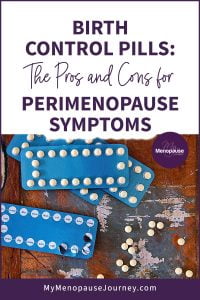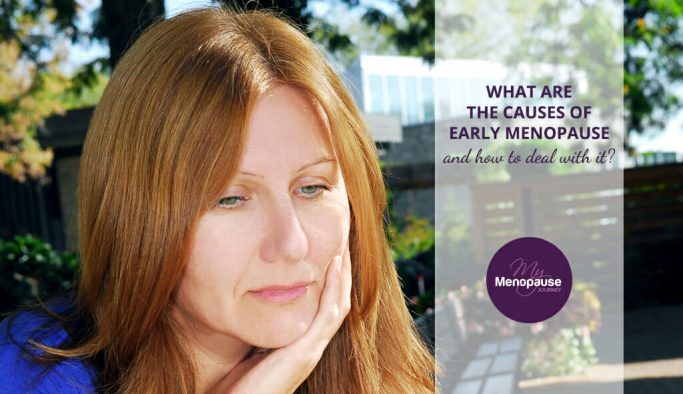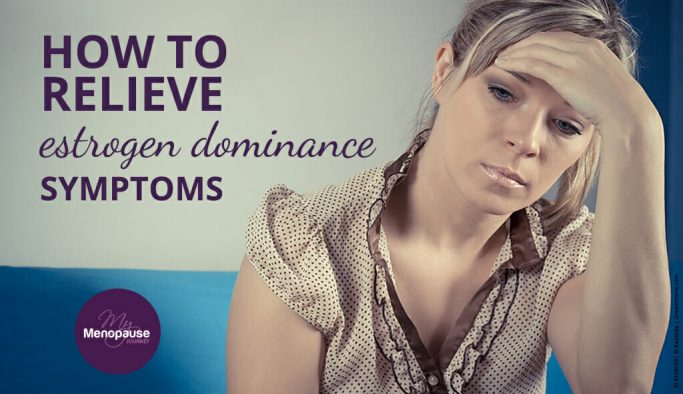Birth Control Pills in Perimenopause According to Functional Medicine
The discovery of birth control pills (BCPs) is a revolutionary product of the human mind. Life is a priceless gift — and responsibility is just as important! We all know that BCPs were primarily created to prevent “unwanted” pregnancy, but over the years, BCPs were also seen to “help” women in perimenopause. Well, here’s a question that I’ve been getting from many midlife ladies:
Do birth control pills’ benefits for perimenopause symptoms outweigh the risks? Or is it the other way around?
In this article, we will have a quick recap first about the symptoms of perimenopause. Then, we will focus on the pros and cons of taking BCPs with regard to perimenopause symptoms! After we tackle all accounts from functional medicine experts, I will share some natural alternatives proven to relieve perimenopause symptoms. Oh, you’ll love them!
Read on and may you find the answer to that question above! ?
Perimenopause: A Quick Revisit to the Unpredictable Phase
Perimenopause is where everything starts. Technically, that “everything” stands for “symptoms”, but it can also be about the “changes” we can embrace to live our best days!
On average, perimenopause happens in our late 30s and 40s. This age bracket is a critical time in our lives where we’re usually busy with family, career or business! Most of us are also preoccupied with being good homemakers or caregivers for our aging parents. It’s a complicated time for most women, and we may feel like we need to stay on top of everything.
So, what happens to our “internal state” at this stage? ?
Perimenopause is one of the most challenging stages. Your hormones and neurotransmitters are unpredictable! Perimenopause is like seeing yourself in a dance class — but your dance instructor changed his mind and taught a dance genre you have no idea about! Also, most women don’t know that they were in perimenopause until many years later. So, how can you fix a problem that you didn’t even know was existing?
In perimenopause, although estrogen levels decline, progesterone drops faster than estrogen. This fluctuation further leaves our estrogen levels relatively high compared to progesterone. When estrogen levels become slightly dominant, it results in a condition called “estrogen dominance” (ED). With low progesterone levels, your estrogen will “hyperactivate” many body processes!
Many women in perimenopause also have tired adrenals — our body’s stress regulating system. Too much stress in our body also takes a toll on all the other symptoms of perimenopause!
But estrogen is not the only culprit for our perimenopause symptoms. Our neurotransmitters also tend to be erratic during this stage! The neurotransmitters want to “do the job” on behalf of our fluctuating hormones — by connecting the signals inside our body. And that’s not an easy job! Imagine being an on-call substitute for a co-worker who might be absent at any moment? ?
So, sometimes, our neurotransmitters are not giving the right signals. These “wrong sent messages” can also hinder, slow down or mess up our body from functioning at its best! Here are the most reported symptoms of perimenopause:
- Irregular periods
- Changes in menstrual flow
- Changes in length of the menstrual cycle
- Hot flashes
- Night sweats
- Bloating
- Trouble sleeping
- Vaginal dryness
- Headaches and migraines
- Mood changes
Generally, our body needs to find a new balance while it enters the doors of menopause. So, look after all aspects of your menopausal life as much as you can! Our overall health in midlife hugely depends on how we take care of ourselves and how prepared we are for the changes that are about to come. ?
What Do Functional Medicine Experts Think About Taking BCPs in Perimenopause?
According to the Centers for Disease Control and Prevention, the number of women using hormonal birth control pills is declining. What could possibly be the reason behind the falling numbers? ?
While some of the decreases could be due to the availability of other hormonal contraceptive methods (IUD, implant, patch, etc.), there is also a growing number of women who learned to love “natural,” hormone-free options. Well, I’m all for that too, especially in managing perimenopause symptoms!
Experts say that the general disadvantage of taking BCPs is how they hide the symptoms of perimenopause. When this happens, it can be difficult to know when you’ve reached perimenopause. Also, it will be a tough game to trace the root causes of why you feel the way you do!
Now, let’s go further and learn what functional medicine experts say…
Dr. Christian Northrup (a leading expert in women’s health and wellness) describes the effects of BCPs as: “It’s kind of like covering the indicator lights on the dashboard of your car with duct tape so you can’t see them when they start flashing and indicating an oil change or engine tune-up is necessary”.
Therefore, perimenopause will still take place as time intends! Suppose a woman continues taking perimenopausal birth control pills. In that case, she may not realize when exactly she has already passed into perimenopause. She may begin to experience symptoms that were previously covered up after stopping the pills.
Dr. Amy Myers, an internationally acclaimed Functional Medicine Physician, also says: “Taking the pill can disrupt your natural hormone balance since they keep estrogen levels artificially high — which has a ripple effect across your endocrine system. These factors can cause a whole myriad of health issues.”
So, what are the most common side effects of BCPs for midlife women?
- Breast Tenderness
- Headaches and Migraine
- Irritability or Moodiness
- Spotting Between Periods (abnormal menstruation)
- Irregular Bleeding (especially in the first few months)
- Nausea
- Puffiness
- Bone Deterioration
- Weight Gain
- Bloating and Fluid Retention
- Low libido
- Vaginal Dryness
- Stress
- Inflammation
- Thyroid problems
- Blood Clot
- Candida Overgrowth
- Liver Toxicity
- Hormonal Imbalance
Furthermore, BCPs do not only affect your hormone levels. They are also robbing your body of several vitamins and minerals! That includes vitamin A, B vitamins, vitamin C, zinc, iron, copper and magnesium. So, if you stay on “the pill”, make sure you’re getting adequate amounts of these essential nutrients through a healthy diet (and supplements, if needed)!
“If a woman chooses to stay on the pill, just tell her to be sure to take a good multivitamin with B complex while on the pill. Because the pill is associated with some very well-documented changes in nutrient levels, particularly folic acid. If these vitamins are not replaced to optimal levels, then the chance of a healthy pregnancy (should the woman desire this) is decreased… Fertility is not a disease. It’s a gift to be guarded and treasured. Why take synthetic hormones 24/7 that result in at least 50 different metabolic derangements in the body, in order to prevent conception — which can take place only for 3 days per month?” — Dr. Christian Northrup
Some functional medicine experts even take BCPs as their “favorite political conversation.” For one, here’s Dr. Sara Gottfried — a functional and integrative medicine expert. During a Question & Answer session with Metagenics Institute, Dr. Sara tackles some of the issues on the pill like:
- Micronutrient deficiency
- The effects of BCPs on testosterone levels
- How the pill is a major cause of hormone imbalance
Dr. Sara shares her thoughts as well about the impact of BCPs on adolescents. Super important if you have teenage daughters! Listen and pick up great, straightforward insights from Dr. Sara! ?
Did that quick video from Dr. Sara leave you wanting more? ?
Well, just in case you’re eager for more facts about hormonal balance, I can lead you to one more interview! Here’s Dr. Mark Hyman, the Head of Strategy and Innovation of Cleveland Clinic’s Center for Functional Medicine. He is joined by Dr. Elizabeth Boham, a Physician and Nutritionist, to discuss the Functional Medicine approach to treating hormonal imbalances!
In this episode, Dr. Hyman and Dr. Boham discuss:
- The prevalence of hormonal imbalances in women
- Using the birth control pill as medical therapy to address PMS, heavy bleeding, and other symptoms of hormonal imbalance
- What happens during perimenopause
- The interrelatedness of hormones and what causes them to be out of balance
- The role of our adrenal glands and how to support them
- The benefits of eating healthy foods to support our hormonal health
- Why maintaining balanced blood sugar is so essential for hormonal health
What are Natural Alternatives for BCPs to Manage Perimenopause Symptoms?
Besides contraception or “unwanted pregnancy”, the end goal of women who take BCPs is to alleviate perimenopause symptoms. And how do we ease these symptoms? By healing the root cause of your discomforts! Here are natural ways to manage perimenopause symptoms:
1. Eat healthily!
I will make this very simple… ?
- Go for organic
- Eat nutrient-dense foods
- Choose healthy fats
- Avoid processed foods and sugar
Also, follow healthy eating habits like intermittent fasting, the Keto-Green way of eating, juicing and detoxifying . Oh, I love healthy eating especially when I start seeing the results!
Who wouldn’t love having more energy, right?! What delights me more is when people say I don’t look my age! (I know you love that too!) Truth be told, I may not totally get rid of some symptoms, but overall, I enjoy midlife. I credit these positive experiences to my healthy eating practices!
2. Embrace more adaptogenic herbs!
Adaptogenic herbs are proven to help optimize body functions and promote hormonal balance! They are also known as “non-estrogenic herbs” because no estrogen-like substance is added to your body. They work directly on the endocrine system to produce more hormones naturally.
Add them to your homemade dishes for an added flavor and extra health benefits! You can find a list of adaptogenic herbs in my article!
3. Take supplements!
Nothing beats the natural nutrients from real foods. But as we age, our body can’t absorb nutrients effectively anymore like it did in our younger years. Luckily, we can find some aid through healthy supplements!
Did you know that vitamins, minerals and natural supplements play a vital part in hormone production and balance? We need them more than ever during menopause! Dietary supplements help us:
- Replenish What We Lack
- Even Out Imbalances
- Support Hormone-Producing Glands
- Promote Optimal Health
- Feel Better in the Long-Term
I know — there is a wide variety of menopause supplements available out there. To help you sort things out, you can find different types of supplements in my article, so you’ll know what’s best for your needs! ?
4. Try seed cycling!
Seed rotation, also known as “seed cycling”, is a perfect example of using food as medicine! It is a method used to balance hormone levels naturally.
Each seed variety is known to contain its own set of nutrients that our hormones need. Seed cycling primarily helps regulate and support the menstrual cycle by boosting estrogen and progesterone levels. Women in midlife, especially those who still have their periods, will benefit the most from seed rotation as it can help relieve many symptoms!
5. Stay active!
Exercise can calm and relax both mind and body. It activates and improves our body’s response to stress — improving blood circulation! It also increases metabolism, gives us energy and stimulates the brain to release happy hormones! ?
Our body likes to adjust to a gradual pace, so we don’t have to do intense exercises. Simple exercises like stretching, walking, using foam rollers, yoga and meditation will make a world of difference and balance hormones naturally!
For a more diverse choice of exercises, feel free to visit my archives!
6. Avoid stressors!
Chronic stress may suppress hormone production. When we experience stress, our body releases the stress hormone “cortisol”. Wondering what cortisol can do to our body?
The Indian Journal of Endocrinology and Metabolism explains that cortisol can negatively alter hormone levels in the body and cause an imbalance. The National Institutes of Health (NIH) also says that stress increases and aggravates our risk of many diseases!
So, it’s high time to slow down, learn to relax and breathe. Unwind and give yourself some “me” time, lovely one!
7. Make sleep a priority!
As we age, we tend to sleep less. Many women in menopause feel tired and drained from energy because of sleep deprivation. Well, it’s time to turn things around, sleepy head!
Adequate and quality sleep can do wonders for your mind and body! If you’re wondering why, it’s because our hormones work on a schedule! Yup, they have a life of their own too! ?
Hormone production follows our body’s biological clock. When our sleeping pattern is not consistent, it will also mess up our hormones. So, if you want to balance your hormones naturally, make sure to get uninterrupted sleep for at least 7-8 hours every night!
Takeaway
We were able to talk about the benefits and negative effects of birth control pills for women in perimenopause. Ultimately, using BCPs for your symptoms is a decision that should be made by you and your doctor — with your overall health well-being in mind.
You can relieve your symptoms using quick-relief tips, but at the end of the day, everything in your body is connected. It talks to you through your symptoms! Don’t just place a bandage. Heal the root cause of your discomforts. ?
Fact Box
• Can we still get pregnant in perimenopause? YES. This is why some women enjoy the perks of BCPs for convenient contraception. Birth control pills come in different dosing packets. Generally, there are two different types of birth control pills — both types contain hormones that prevent pregnancy:
- Combination oral contraceptives (COCs): Contain both estrogen and progestin — a form of progesterone that plays a role in the menstrual cycle and pregnancy.
- Progestin-only pills (also called “the mini pill”): As the name suggests, it only contains progestin. This type of BCP works for breastfeeding women and those with a history of blood clots and strokes.
• In terms of preventing pregnancy, the hormones in birth control pills work in the following ways:
- Stopping or reducing ovulation (the release of an egg from an ovary)
- Thickening cervical mucus to keep sperm from entering the uterus
- Thinning the lining of the uterus so that a fertilized egg is less likely to attach
• I bumped into a great video from Ms. Diane Feller on Instagram! Diane has special training and expertise as a North American Menopause Society (NAMS) Certified Menopause Practitioner. In her video, she explains how hormone replacement therapy (HRT) can be a possible alternative to BCPs when managing perimenopause symptoms! ?
“How much the birth control pill or patch can help with individual symptoms of perimenopause”
• Who is at a higher risk of the negative impacts of BCPs? Of course, it is vital to know your risk level if you choose to take BCPs for perimenopause symptoms. For one, experts say that BCPs are not recommended for those who smoke. BCPs may also be unsafe for those who have certain health conditions like:
- Hypertension [HBP: Causes of High Blood Pressure and How to Lower It in Menopause (mymenopausejourney.com)]
- Chronic migraines or neurological conditions
- History of blood clots (thromboembolism)
- History of stroke
- Tumor or cancer
- Vaginal bleeding
- Jaundice


We would love to hear your thoughts so feel free to add your comments below
Let´s support each other. Use the share buttons in this article, so more women can get help and feel great!
References:
healthpartners.com/blog/birth-control-and-menopause/
everydayhealth.com/menopause/using-the-pill-to-treat-menopause.aspx
my.clevelandclinic.org/health/drugs/3977-birth-control-the-pill
ncbi.nlm.nih.gov/pmc/articles/PMC6165915/
wellandgood.com/is-birth-control-bad-for-you/
drnorthrup.com/birth-control-pills-and-sex-drive/
.theholistichealthapproach.com/blog/oralcontraception
saragottfriedmd.com/the-birth-control-pill-7-reasons-why-you-may-want-to-stop-and-how-to-stay-healthy-if-you-dont/
amymyersmd.com/article/hormone-balance-birth-control-pills/
drhyman.com/blog/2020/04/10/podcast-hc6/
ncbi.nlm.nih.gov/pmc/articles/PMC5592309/
ncbi.nlm.nih.gov/pmc/articles/PMC7921945/
marksdailyapple.com/the-pill-what-you-need-to-know-about-oral-contraception/
parsleyhealth.com/blog/hormonal-birth-control-side-effects/
👉 What to Do Next
Don’t go just yet — especially if you’ve been feeling off and no one’s given you real answers.
Go to the START HERE page.
It’s where things begin to feel clearer. No more second-guessing, no more sorting through conflicting advice. Just calm, honest support for where you are right now.
And if you haven’t yet, download the FREE GUIDE.
It’s quick, clear, and made to help you feel better — without having to turn your whole life upside down.


Gita is the founder of My Menopause Journey. Since 2014, she has been supporting midlife women by sharing hard-earned learnings from her own experience. To advance her knowledge, Gita puts a lot of her time and effort into understanding the broad spectrum of women’s health. She immerses in extensive research about the physical, mental and emotional aspects of menopause. Gita believes in the life-changing power of healthy, holistic living — this is where she anchors her message to all women. Learn more about her marvelous mission in About us - My Menopause Journey.






